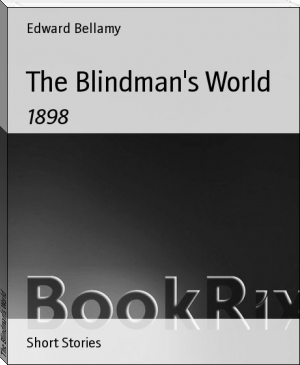The Blindman's World, Edward Bellamy [free ereaders .txt] 📗

- Author: Edward Bellamy
Book online «The Blindman's World, Edward Bellamy [free ereaders .txt] 📗». Author Edward Bellamy
yet find a mine of information here."
In the course of our further conversation it came out that, as a consequence of foresight, some of the commonest emotions of human nature are unknown on Mars. They for whom the future has no mystery can, of course, know neither hope nor fear. Moreover, every one being assured what he shall attain to and what not, there can be no such thing as rivalship, or emulation, or any sort of competition in any respect; and therefore all the brood of heart-burnings and hatreds, engendered on Earth by the strife of man with man, is unknown to the people of Mars, save from the study of our planet. When I asked if there were not, after all, a lack of spontaneity, of sense of freedom, in leading lives fixed in all details beforehand, I was reminded that there was no difference in that respect between the lives of the people of Earth and of Mars, both alike being according to God's will in every particular. We knew that will only after the event, they before,--that was all. For the rest, God moved them through their wills as He did us, so that they had no more dense of compulsion in what they did than we on Earth have in carrying out an anticipated line of action, in cases where our anticipations chance to be correct. Of the absorbing interest which the study of the plan of their future lives possessed for the people of Mars, my companion spoke eloquently. It was, he said, like the fascination to a mathematician of a most elaborate and exquisite demonstration, a perfect algebraical equation, with the glowing realities of life in place of figures and symbols.
When I asked if it never occurred to them to wish their futures different, he replied that such a question could only have been asked by one from the Earth. No one could have foresight, or clearly believe that God had it, without realizing that the future is as incapable of being changed as the past. And not only this, but to foresee events was to foresee their logical necessity so clearly that to desire them different was as impossible as seriously to wish that two and two made five instead of four. No person could ever thoughtfully wish anything different, for so closely are all things, the small with the great, woven together by God that to draw out the smallest thread would unravel creation through all eternity.
While we had talked the afternoon had waned, and the sun had sunk below the horizon, the roseate atmosphere of the planet imparting a splendor to the cloud coloring, and a glory to the land and sea scape, never paralleled by an earthly sunset. Already the familiar constellations appearing in the sky reminded me how near, after all, I was to the Earth, for with the unassisted eye I could not detect the slightest variation in their position. Nevertheless, there was one wholly novel feature in the heavens, for many of the host of asteroids which circle in the zone between Mars and Jupiter were vividly visible to the naked eye. But the spectacle that chiefly held my gaze was the Earth, swimming low on the verge of the horizon. Its disc, twice as large as that of any star or planet as seen from the Earth, flashed with a brilliancy like that of Venus.
"It is, indeed, a lovely sight," said my companion, "although to me always a melancholy one, from the contrast suggested between the radiance of the orb and the benighted condition of its inhabitants. We call it 'The Blindman's World.'" As he spoke he turned toward a curious structure which stood near us, though I had not before particularly observed it.
"What is that?" I asked.
"It is one of our telescopes," he replied. "I am going to let you take a look, if you choose, at your home, and test for yourself the powers of which I have boasted;" and having adjusted the instrument to his satisfaction, he showed me where to apply my eye to what answered to the eye-piece.
I could not repress an exclamation of amazement, for truly he had exaggerated nothing. The little college town which was my home lay spread out before me, seemingly almost as near as when I looked down upon it from my observatory windows. It was early morning, and the village was waking up. The milkmen were going their rounds, and workmen, with their dinner-pails, where hurrying along the streets. The early train was just leaving the railroad station. I could see the puffs from the smoke-stack, and the jets from the cylinders. It was strange not to hear the hissing of the steam, so near I seemed. There were the college buildings on the hill, the long rows of windows flashing back the level sunbeams. I could tell the time by the college clock. It struck me that there was an unusual bustle around the buildings, considering the earliness of the hour. A crowd of men stood about the door of the observatory, and many others were hurrying across the campus in that direction. Among them I recognized President Byxbee, accompanied by the college janitor. As I gazed they reached the observatory, and, passing through the group about the door, entered the building. The president was evidently going up to my quarters. At this it flashed over me quite suddenly that all this bustle was on my account. I recalled how it was that I came to be on Mars, and in what condition I had left affairs in the observatory. It was high time I were back there to look after myself.
Here abruptly ended the extraordinary document which I found that morning on my desk. That it is the authentic record of the conditions of life in another world which it purports to be I do not expect the reader to believe. He will no doubt explain it as another of the curious freaks of somnambulism set down in the books. Probably it was merely that, possibly it was something more. I do not pretend to decide the question. I have told all the facts of the case, and have no better means for forming an opinion than the reader. Nor do I know, even if I fully believed it the true account it seems to be, that it would have affected my imagination much more strongly than it has. That story of another world has, in a word, put me out of joint with ours. The readiness with which my mind has adapted itself to the Martial point of view concerning the Earth has been a singular experience. The lack of foresight among the human faculties, a lack I had scarcely thought of before, now impresses me, ever more deeply, as a fact out of harmony with the rest of our nature, belying its promise,--a moral mutilation, a deprivation arbitrary and unaccountable. The spectacle of a race doomed to walk backward, beholding only what has gone by, assured only of what is past and dead,' comes over me from time to time with a sadly fantastical effect which I cannot describe. I dream of a world where love always wears a smile, where the partings are as tearless as our meetings, and death is king no more. I have a fancy, which I like to cherish, that the people of that happy sphere, fancied though it may be, represent the ideal and normal type of our race, as perhaps it once was, as perhaps it may yet be again.
Imprint
In the course of our further conversation it came out that, as a consequence of foresight, some of the commonest emotions of human nature are unknown on Mars. They for whom the future has no mystery can, of course, know neither hope nor fear. Moreover, every one being assured what he shall attain to and what not, there can be no such thing as rivalship, or emulation, or any sort of competition in any respect; and therefore all the brood of heart-burnings and hatreds, engendered on Earth by the strife of man with man, is unknown to the people of Mars, save from the study of our planet. When I asked if there were not, after all, a lack of spontaneity, of sense of freedom, in leading lives fixed in all details beforehand, I was reminded that there was no difference in that respect between the lives of the people of Earth and of Mars, both alike being according to God's will in every particular. We knew that will only after the event, they before,--that was all. For the rest, God moved them through their wills as He did us, so that they had no more dense of compulsion in what they did than we on Earth have in carrying out an anticipated line of action, in cases where our anticipations chance to be correct. Of the absorbing interest which the study of the plan of their future lives possessed for the people of Mars, my companion spoke eloquently. It was, he said, like the fascination to a mathematician of a most elaborate and exquisite demonstration, a perfect algebraical equation, with the glowing realities of life in place of figures and symbols.
When I asked if it never occurred to them to wish their futures different, he replied that such a question could only have been asked by one from the Earth. No one could have foresight, or clearly believe that God had it, without realizing that the future is as incapable of being changed as the past. And not only this, but to foresee events was to foresee their logical necessity so clearly that to desire them different was as impossible as seriously to wish that two and two made five instead of four. No person could ever thoughtfully wish anything different, for so closely are all things, the small with the great, woven together by God that to draw out the smallest thread would unravel creation through all eternity.
While we had talked the afternoon had waned, and the sun had sunk below the horizon, the roseate atmosphere of the planet imparting a splendor to the cloud coloring, and a glory to the land and sea scape, never paralleled by an earthly sunset. Already the familiar constellations appearing in the sky reminded me how near, after all, I was to the Earth, for with the unassisted eye I could not detect the slightest variation in their position. Nevertheless, there was one wholly novel feature in the heavens, for many of the host of asteroids which circle in the zone between Mars and Jupiter were vividly visible to the naked eye. But the spectacle that chiefly held my gaze was the Earth, swimming low on the verge of the horizon. Its disc, twice as large as that of any star or planet as seen from the Earth, flashed with a brilliancy like that of Venus.
"It is, indeed, a lovely sight," said my companion, "although to me always a melancholy one, from the contrast suggested between the radiance of the orb and the benighted condition of its inhabitants. We call it 'The Blindman's World.'" As he spoke he turned toward a curious structure which stood near us, though I had not before particularly observed it.
"What is that?" I asked.
"It is one of our telescopes," he replied. "I am going to let you take a look, if you choose, at your home, and test for yourself the powers of which I have boasted;" and having adjusted the instrument to his satisfaction, he showed me where to apply my eye to what answered to the eye-piece.
I could not repress an exclamation of amazement, for truly he had exaggerated nothing. The little college town which was my home lay spread out before me, seemingly almost as near as when I looked down upon it from my observatory windows. It was early morning, and the village was waking up. The milkmen were going their rounds, and workmen, with their dinner-pails, where hurrying along the streets. The early train was just leaving the railroad station. I could see the puffs from the smoke-stack, and the jets from the cylinders. It was strange not to hear the hissing of the steam, so near I seemed. There were the college buildings on the hill, the long rows of windows flashing back the level sunbeams. I could tell the time by the college clock. It struck me that there was an unusual bustle around the buildings, considering the earliness of the hour. A crowd of men stood about the door of the observatory, and many others were hurrying across the campus in that direction. Among them I recognized President Byxbee, accompanied by the college janitor. As I gazed they reached the observatory, and, passing through the group about the door, entered the building. The president was evidently going up to my quarters. At this it flashed over me quite suddenly that all this bustle was on my account. I recalled how it was that I came to be on Mars, and in what condition I had left affairs in the observatory. It was high time I were back there to look after myself.
Here abruptly ended the extraordinary document which I found that morning on my desk. That it is the authentic record of the conditions of life in another world which it purports to be I do not expect the reader to believe. He will no doubt explain it as another of the curious freaks of somnambulism set down in the books. Probably it was merely that, possibly it was something more. I do not pretend to decide the question. I have told all the facts of the case, and have no better means for forming an opinion than the reader. Nor do I know, even if I fully believed it the true account it seems to be, that it would have affected my imagination much more strongly than it has. That story of another world has, in a word, put me out of joint with ours. The readiness with which my mind has adapted itself to the Martial point of view concerning the Earth has been a singular experience. The lack of foresight among the human faculties, a lack I had scarcely thought of before, now impresses me, ever more deeply, as a fact out of harmony with the rest of our nature, belying its promise,--a moral mutilation, a deprivation arbitrary and unaccountable. The spectacle of a race doomed to walk backward, beholding only what has gone by, assured only of what is past and dead,' comes over me from time to time with a sadly fantastical effect which I cannot describe. I dream of a world where love always wears a smile, where the partings are as tearless as our meetings, and death is king no more. I have a fancy, which I like to cherish, that the people of that happy sphere, fancied though it may be, represent the ideal and normal type of our race, as perhaps it once was, as perhaps it may yet be again.
Imprint
Publication Date: 08-13-2010
All Rights Reserved
Free e-book «The Blindman's World, Edward Bellamy [free ereaders .txt] 📗» - read online now
Similar e-books:





Comments (0)